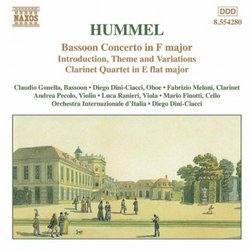| All Artists: Johann Nepomuk Hummel, Diego Dini-Ciacci, Italian International Orchestra Title: Hummel:Bassoon Concerto in F major Members Wishing: 0 Total Copies: 0 Label: Naxos Release Date: 6/22/1999 Genre: Classical Styles: Chamber Music, Forms & Genres, Concertos, Historical Periods, Classical (c.1770-1830), Instruments, Reeds & Winds, Symphonies Number of Discs: 1 SwapaCD Credits: 1 UPC: 636943428023 |
Search - Johann Nepomuk Hummel, Diego Dini-Ciacci, Italian International Orchestra :: Hummel:Bassoon Concerto in F major
 | Johann Nepomuk Hummel, Diego Dini-Ciacci, Italian International Orchestra Hummel:Bassoon Concerto in F major Genre: Classical
|
Larger Image |
CD Details |
CD ReviewsElegant pieces, not especially striking Timmy | New York, Ny United States | 12/09/2000 (4 out of 5 stars) "Hummel was a very inventive composer of the late Viennese period. In my opinion, however, these pieces do not reflect his brilliance nearly as well as do his piano concertos or his septets. They are pleasant to listen to, but not particularly striking. it is interesting to note that all require extreme virtuosity from the performers. The bassoon concerto is in a style very similar to Mozart's, and nice to hear considering the rather limited bassoon repertoire. The variations for oboe and orchetra are pretty, but I find to the variations to be somewhat simple and unoriginal. The clarinet quartet is very interesting to listen to. Its second movement requires each of the four players to play in a different meter. Although I feel it lacks the grace of the other two pieces, it is certainly the most original of the three. Either way, while these aren't Hummel's best works, they warrant a listening." Good for wind lovers; not so good for Bassoon lovers M. Ramshaw | 05/12/2009 (4 out of 5 stars) "I had heard the Bassoon concerto on the radio and was looking for a good recording.
I had bought a recording that I was unhappy with, and so I asked an expert and read the reviews here. This recording was highly recommended by my expert, also here. While I am very pleased with the quality of the recording and the playing, I feel the Bassoon parts suffer from perhaps too much fidelity in the recording, as the mechanics of the instrument and its playing seem far too evident on the recording. As the previous reviewer has pointed out, it seems to be characteristic of Hummel's music that it demands the utmost of the soloist. As a child prodigy and student of Mozart, Hummel seems to have been a victim of a change in musical tastes. He also went on to study with the same teachers as Beethoven, and was by some accounts his equal as a performer. So it would seem that rather than embrace the newer musical styles, he sought to differentiate himself by writing more difficult solo music. Here I disagree with the previous reviewer, in that I very much liked the Oboe variations (and would very much like to hear them transposed for Bassoon). No doubt I have simpler tastes than the previous reviewer, but it is pleasant to me to hear Hummel address the style of Mozart's writing, even at a time when this was no doubt opposite to the prevailing tastes. That said, I enjoy all of these pieces, with the possible exception of the Bassoon concerto (which is not entirely to my taste)." |

 Track Listings (9) - Disc #1
Track Listings (9) - Disc #1